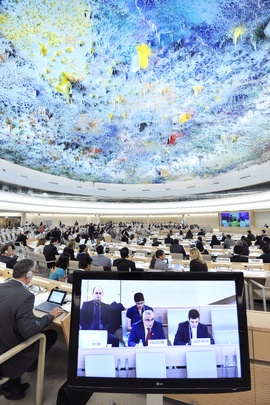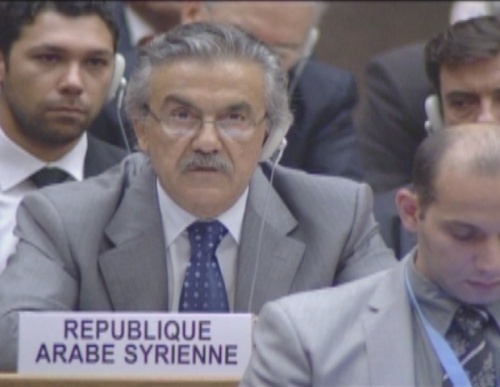

The top UN human rights body today (August 23, 2011) decided to dispatch an independent international commission of inquiry to Syria to investigate alleged abuses committed during the Government’s crackdown on protesters. In a resolution adopted at the end of a two-day special session, the Geneva-based Human Rights Council also strongly condemned the “continued grave and systematic human rights violations by the Syrian authorities.” (From Human Rights Council & UN News Centre Sources)
By a vote of 33 in favor to 4 against, with 9 abstentions, the 47-member Council also welcomed the report of the fact-finding mission of the Office of the High Commissioner for Human Rights (OHCHR), which UN human rights chief Navi Pillay presented yesterday, and expressed profound concern about its findings. The report, which covered the period from 15 March to 15 July, outlined a litany of Government abuses ranging from murder, enforced disappearances, deprivation of liberty and the torture even of children to an apparent “shoot-to-kill” policy against protesters with snipers posted on rooftops. (See FILM REPORT –
diplomaticallyincorrect.org/films/movie/crimejustice-syria/28259 )
To Identify Crimes & Perpetrators:
This UN Human Rights Council resolution goes significantly further than the condemnation adopted earlier this spring. (See FILM REPORT -
diplomaticallyincorrect.org/films/movie/syria-inquiry-human-rights-council/26584 ).
The probe ordered today by the Council will investigate all alleged violations of international human rights law since March 2011, and establish the facts and circumstances that may amount to such violations and of the crimes perpetrated.
It will also, where possible, identify those responsible with a view of ensuring that perpetrators of violations, including those that may constitute crimes against humanity, are held accountable. The resolution requests that the report of the commission of inquiry be made public as soon as possible.
As many as 2,000 Syrians have been killed in the past five months since the start of the pro-democracy protests, which are part of a broader uprising across North Africa and the Middle East that has led to the toppling of long-standing regimes in Tunisia and Egypt and conflict in Libya.
Voting Results
Votes in Favour (33): Austria, Belgium, Benin, Botswana, Burkina Faso, Chile, Congo, Costa Rica, Czech Republic, Guatemala, Hungary, Indonesia, Italy, Jordan, Kuwait, Kyrgyzstan, Maldives, Mauritius, Mexico, Nigeria, Norway, Peru, Poland, Qatar, Republic of Moldova, Romania, Saudi Arabia, Senegal, Spain, Switzerland, Thailand, United States of America, and Uruguay.
Votes Against (4): China, Cuba, Ecuador, and Russian Federation.
Abstentions (9): Angola, Bangladesh, Cameroon, Djibouti, India, Malaysia, Mauritania, Philippines, and Uganda.
Below are summaries of the Statements made and Debate between states who have been elected to the UN Human Rights Council:
Poland, introducing the resolution, said that the text represented a clear response by the Council to the ongoing and systematic violations in Syria and the continued violence and lack of respect for fundamental rights and freedoms.
Russian Federation and China made general comments and requested that the draft resolution be put to a vote.
Russian Federation said that the draft resolution remained one-sided and politicized. It did not take into account the positive steps taken by the Syrian authorities to engage the country and introduce elections; it ignored the willingness of the Syrian Authorities to engage in dialogue; and it was essentially aimed at removing a legitimate government. China said that the correct way to protect human rights was not through accusations and that a response to the current crisis should be based on respect for the United Nations Charter, Syria’s sovereignty and the promotion of dialogue.
Syria, speaking as a concerned country, regretted the fact that this resolution remained political and unbalanced. The resolution sent a mistaken message which poorly described the situation. The authors of the draft refused to respond to attempts to change the resolution in order to make it more balanced, and this reflected the clear will to intervene politically in an independent and sovereign country. Syria had declared yesterday that it was prepared to receive a mission of inquiry from the Office of the High Commissioner. This statement, however, had not been favorably welcomed by the States who prepared the draft resolution and this confirmed their determination to politically condemn Syria and to pass over any proposals for reform that existed in Syria.
Cuba, Uruguay and India spoke in explanation of vote before the vote. Representatives from Thailand and Indonesia made statements in explanation of vote after the vote.
The next regularly scheduled session of the Human Rights Council will be from 12 to 30 September 2011 in the Palais des Nations in Geneva.
Summary of the Resolution
The resolution, referred to as (A/HRC /S-17/L.1) on The human rights situation in the Syrian Arab Republic, recalls resolution S-16/1 and strongly condemns the continued grave and systematic human rights violations by the Syrian authorities; welcomes the report of the fact-finding mission of the Office of the High Commissioner for Human Rights and expresses profound concern about its findings, including that patterns of human rights violations existed that may amount to crimes against humanity. The resolution calls upon the Syrian authorities to immediately put an end to all human rights violations, to protect their population and fully comply with their obligations and calls for an immediate end to all violence in Syria. It also decides to urgently dispatch an independent international commission of inquiry to investigate all alleged violations of international human rights law since March 2011. The resolution calls for a Syrian led political process and for an inclusive, credible and genuine national dialogue conducted in an environment without fear and intimidation and with the aim of addressing the legitimate aspirations and concerns of the Syrian population.
Will Resolution make a Difference:
It is unlikely that Syria will allow an unhindered access for the investigators. Nonetheless, their may be enough evidence produced to call for an International Criminal Court direct involvement. Otherwise, civil and insurgency are more likely to evolve into more full blown internal or perhaps regional conflict. The Damascus regime though still holds overwhelming military might and is crushing protesters even before they can become rebels.
Related ARTICLE “What Next in Syria” -
diplomaticallyincorrect.org/films/blog_post/what-next-on-syria-it-is-civil-war-already-but-insurgency-by-ambassador-mo/33413
By Ambassador Muhamed Sacirbey
Facebook – Become a Fan at “Diplomatically Incorrect”
Twitter – Follow us at DiplomaticallyX



